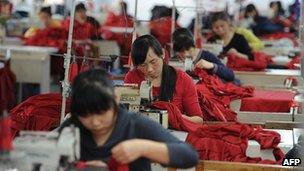Chinese New Year can help Beijing sell 'brand China'
- Published

Despite its economic success many still view China as just a hub for low-cost manufacturing
For the most heavily populated nation on earth and its rapidly spreading diaspora, elements of Chinese New Year celebrations can sometimes resemble Christmas: people travel great distances to be together, businesses shut down, cities become quiet.
Spending quality time with family and friends; exchanging the ubiquitous red packets containing freshly minted bank notes for luck; and eating and drinking are a few of the many key ingredients to celebrating the Lunar New Year.
Given the importance of the festival and the growing size of the Chinese community, this period is clearly a commercial bonanza for many Asian suppliers.
Equally, foreign brands can embrace the business opportunity by taking time to fully understand the tradition and culture of Chinese New Year - the differences from country to country, market to market - and enhance their brands' connections with consumers.
But while Asian or international brands can cash in, there is perhaps a bigger opportunity for China to enhance its position as a brand on the global stage.
Brand China
As a marketer, it's clear to me that viewing countries as brands in their own right is increasingly important in a world where perceptions about nations are quickly shaped - rightly or wrongly - through the explosion of 24/7 media.
If countries perceive themselves as brands, they can better influence the dialogue about their role in the world by both internal and external audiences.
To do that, countries need to have a clear view of their positive attributes and values, and why those are relevant to the outside world. Too often these manifest themselves as national stereotypes that make governments feel good but fail to motivate the intended target.
This has been a challenge for China in recent times. Despite the massive success that has seen it become the world's second-largest economy, to many outside the business world, "made in China" still manages to plant the seeds of doubt about product quality.
This is an unfair paradox, since Chinese factories have been making products for some of the biggest and most admired brands in the world for years, even though we have yet to see the emergence of a Chinese brand that has lasting global appeal and acceptance.
Just think back to the 1970s. "Made in Japan" equated to poor workmanship and cheap products. Yet Sony turned that perception on its head almost single-handedly, with a couple of world-beating products and a well-defined brand.
Where to from here?
Think of a few other iconic, global brands: Apple, Nike, GE. They share common traits: authenticity combined with visible, tangible values.
All constantly strive to reinvent themselves, to be newly relevant. They are respectful of the past, but not bound by it.

Some of the world's most popular brands and gadgets are manufactured in Chinese factories
Countries like China can learn from this. A country with a strong, positive and forward-looking brand image can lead to increased inward investment, more tourism, and increased trust. All vital elements for a country which is now a major player in shaping the future of the global economy.
This in turn can help Chinese brands gain more acceptance with global consumers, further driving China's growth.
As a first step, China can view the Lunar New Year as an opportunity to help educate the rest of the world about what it stands for in the world today. To positively and proactively engage people about its values, history, culture and - critically - its ambitions.
Chinese New Year is an authentic expression of values, beliefs and attitudes that are centuries old. A very large section of the world does not understand the significance of this.
Reclaiming its place
I recall many friends and colleagues commenting on the spectacular visual images of China's contributions to world that played across our screens during the opening ceremony of the 2008 Beijing Olympics. The general view was that "China has arrived".
I couldn't have disagreed more. In my view it wasn't about China "arriving". It was about China reclaiming its place on the world stage as a rapidly growing economic powerhouse.
I gently reminded my friends and colleagues that certain cultures still think in thousand-year cycles, not just the next two financial quarters.
Patience and a longer-term view are rare commodities these days. The most successful global brands understand this.
- Published24 November 2011
- Published16 December 2011
- Published9 December 2011